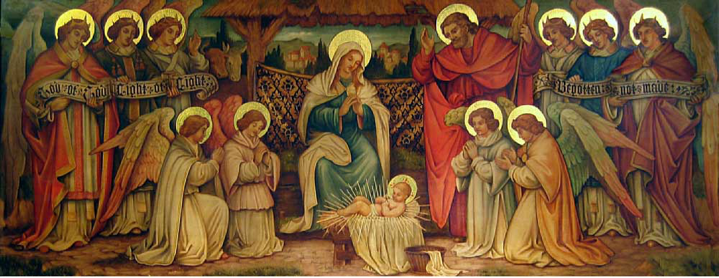The Introit (Philippians 4:4-6; Psalm 84:2) Gaudete in Domino semper … Rejoice in the Lord always: again, I say, rejoice. Let your modesty be known to all men: for the Lord is nigh. Be nothing solicitous: but in every thing by prayer let your petitions be made known to God. (Ps.) Lord, You have blessed your land. You have turned away the captivity of Jacob. Glory be to the Father and to the Son and to the Holy Ghost. As it was in the beginning is now and ever shall be, world without end. Rejoice in the Lord always … Amen.
The Collect Incline your ear, we beseech You, O lord, to our petitions: and by the grace of your visitation, enlighten the darkness of our minds; who lives and reigns forever …
The Epistle (Philippians 4:4-7) Brethren, Rejoice in the Lord always; again I will say, rejoice! Let your modesty be known to all men. The Lord is near. Be anxious for nothing, but in everything by prayer and supplication with thanksgiving let your requests be made known to God. And the peace of God, which surpasses all comprehension, will guard your hearts and your minds in Christ Jesus.
The Gradual (Psalm 79:2, 3, 2) You, O Lord, who are seated above the cherubim, stir up your might and come. Give ear, o You who rules Israel, who leads Joseph like a sheep.
Alleluia Alleluia, alleluia, stir up, Lord, your might and come to save us. Alleluia.
The Gospel (John 1:19-28) At that time, the Jews when the Jews sent from Jerusalem priests and Levites to John, to ask him: “Who art thou?” And he confessed, and did not deny: and he confessed: “I am not the Christ”. And they asked him: “What then? Art thou Elijah?” And he said: “I am not”. “Art thou the prophet”? And he answered: “No”. They said therefore unto him: “Who art thou, that we may give an answer to them that sent us? What sayest thou of thyself?” He said: “I am the voice of one crying out in the wilderness, make straight the way of the Lord, as said the prophet Isaiah”. And they that were sent, were of the Pharisees. And they asked him, and said to him: “Why then dost thou baptize, if thou be not Christ, nor Elijah, nor the prophet?” John answered them, saying: “I baptize with water; but there hath stood one in the midst of you, whom you know not. The same is he that shall come after me, who is preferred before me: the latchet of whose shoe I am not worthy to loose.” These things were done in Bethania, beyond the Jordan, where John was baptizing.
Offertory (Psalm 84:2, 3) Lord, You have blessed your Land: You have turned away the captivity of Jacob. You have forgiven the iniquity of your people.
The Secret May the sacrifice of our devotion, we beseech You, Lord, be continually offered up to You. May it both complete the institution of the holy mysteries, and wondrously accomplish in us your salvation. Through Our Lord Jesus Christ …
Communion (Isaiah 35:4) Say: “You who are fainthearted, take courage and fear not. Behold, our God will come and save us.”
Postcommunion We implore thy mercy, O Lord, that these divine helps may expiate our sins, and prepare us for the approaching feast. Through Our Lord …
The Ember Fasts
The “Ember Days” are named from English Ymbrendaeg, “recurring,” “running/coursing”, and “days,” therefore “days of the recurring course.” The Days were penitential periods, one for each season of the year, celebrated on the Wednesday, Friday and Saturday of each of the four weeks (being after the third Sunday of Advent, after the first Sunday of Lent, after Pentecost and after the third Sunday in September). They were accompanied with fasts and either abstinence from flesh meat or what is called “half-abstinence”, where one can eat meat only at one meal each day. So, we can think like this: The Ember Fasts are the fasts which recur during the year (unlike the Lenten and Holy Week Fasts which are observed but once a year). The Ember seasons strengthen us by teaching us not only not to fear mortification, but even to recognise it as a good. Let us commit to the Ember fasts over this week.
Dedicating the Day to God
If we want to live more religious lives, we could choose days to dedicate to God. If we dedicate every day to God it is like having a birthday every day: it would mean nothing in the end. But I can choose a special day to dedicate to Him: for example, Sunday. We can do that. But then, there are other days I can dedicate to God. If I am going away, or I have an exam, or am going in to hospital for an operation, that would be a good day to dedicate to Him. Then, there can be special days we dedicate to God in honour of our departed family and friends. On those days there is something special in addition: we pray for that person or persons on that day with a special fervour. Sometimes, I dedicate the day to God and I then look to see if that dedication makes a difference to my day or not. It usually does. The idea of dedicating a day to God helps us to concentrate, to be more intense. But what does it mean to dedicate a day to God? Well, when we dedicate a building to someone we name the building after them, and we place their name on it where everyone can see it. Then, whenever we enter the building, we remember that person, what they mean to us, and that we should be on our best behaviour.
